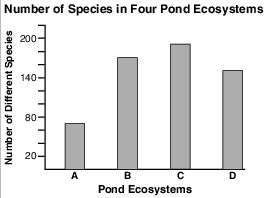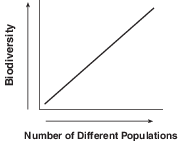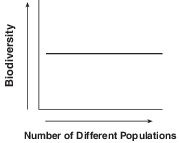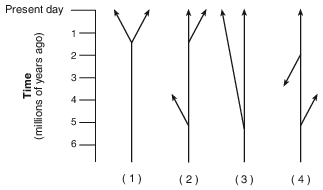Topic: Effect Of Biodiversity
Effect Of Biodiversity
Sugar maples and white pines are two different tree species that often grow side by side in the Adirondack Mountains. Which statement concerning these trees is correct?
(1) Since they are both trees, they can interbreed.
(2) Since they are not closely related, they do not compete with one another.
(3) Even though they are both trees, each plays a different role in the ecosystem.
(4) They utilize totally different abiotic resources.
Members of a bird-watching club observed the activities of three species of birds for an entire spring and summer. They noticed that the different species fed at different heights in the same pine tree. Which ecological concept is supported by this observation?
(1) Organisms that feed on different foods in the same area of an ecosystem fill the same niche.
(2) Organisms that live in the same ecosystem can occupy different niches in the ecosystem.
(3) Different species feeding in the same ecosystem will eventually compete with each other, eliminating all the species except one.
(4) Different species living in the same area of an ecosystem usually have the same physical characteristics.
The bar graph below shows the number of species in four pond ecosystems.

Based on this information, which ecosystem is likely to be the most stable?
(1) A
(2) B
(3) C
(4) D
A rich variety of genetic material in an ecosystem will
(1) reduce the biodiversity of the ecosystem
(2) decrease the carrying capacity of the ecosystem
(3) reduce the likelihood of future medical discoveries
(4) increase the chances that some organisms will survive change
When a natural disaster destroys a stable ecosystem, the area is temporarily less stable than before. This is most likely due to
(1) a decrease in biodiversity
(2) an increase in the number of food chains
(3) an increase in the number of species
(4) a decrease in the rate of mutation
Which graph best shows the relationship between the amount of biodiversity and the number of different populations in an ecosystem?
(1) 
(2) 
(3) 
(4) 
Yes, This Big Lizard is Pink
A new study from the University of Rome Tor Vergata shows that a rare strawberry-tinted land iguana [rosada iguana] in the Galapagos Islands is genetically distinct from other iguanas there, having diverged from them more than five million years ago as the archipelago [a group of islands] formed. The rosada iguana—which escaped Darwin’s notice—was discovered only recently, largely because it lives on the desolate slopes of an active volcano.
Source: Smithsonian, March 2009
Which diagram best represents the evolutionary pathway of the strawberry-tinted iguana?

(1) 1
(2) 2
(3) 3
(4) 4
A researcher concludes from a 10-year study that the biodiversity of an ecosystem had increased. Which set of observations represents evidence for this claim?
(1) There were more niches and greater stability in the ecosystem.
(2) There were more niches and less energy lost as heat in the ecosystem.
(3) There were fewer niches for decomposers and less stability.
(4) There were fewer niches for consumers and greater cycling of materials.
A stable ecosystem can have high biodiversity because each species in that ecosystem
(1) occupies a different niche
(2) inhabits a different environment
(3) is part of a different community
(4) lives in a different biosphere
A decrease in the biodiversity of an ecosystem usually leads to
(1) an increase in predator and prey populations
(2) the elimination of material cycling
(3) a decrease in stability
(4) an increase in dynamic equilibrium
People living in and around the Amazon rain forest have used parts of the gaviola tree to prepare medicines. Research is being conducted to determine if this tree can provide cures for many types of cancer. Continued destruction of rain forests might
(1) reduce biodiversity and remove organisms with the potential to help humans
(2) increase biodiversity and remove damaged and diseased trees
(3) reduce biodiversity and increase the reproductive rates of all organisms
(4) increase biodiversity and ecosystem stability where humans plant crops
Researchers have discovered a chemical that sterilizes soil by killing all of the bacteria that are normally present. If this chemical were released in a forest ecosystem, the most likely result would be that
(1) the food web would be disrupted because there would be little recycling of nutrients
(2) fewer animals would suffer from disease such as cancer
(3) there would be more energy available for insects and worms that live in the soil
(4) the diversity of plants and animals present would increase
The year 2010 was declared the International Year of Biodiversity. However, significant loss of biodiversity is still occurring. Researchers around the world are working on a variety of ways to protect natural resources. According to an article in Science News, March 13, 2010, “reversing the downward spiral of biodiversity will take more than protecting wild places, but that’s where scientists are starting.”
Explain the importance of biodiversity to an ecosystem. In your answer, be sure to:
• state one effect of a loss of biodiversity in an ecosystem [1]
• identify a source of variation within a species that leads to biodiversity [1]
• identify one specific ecosystem that has shown a decrease in biodiversity and state one cause of the decrease in biodiversity in the ecosystem you identified [1]
• identify one human activity, other than setting up protected wildlife areas, that has helped to preserve biodiversity [1]
The student’s response to the bulleted items in the question need not appear in the following order.
• 13 Allow 1 credit for stating one effect of a loss of biodiversity in an ecosystem. Acceptable responses include, but are not limited to:
• — The less biodiversity there is in an ecosystem, the less stable the ecosystem will be.
• — A loss of biodiversity would make it harder for the ecosystem to maintain stability.
• — It would reduce resources/food/shelter that are used by the organisms in the ecosystem.
• — A species might become extinct.
• Note: Allow credit only for an “effect of a loss of biodiversity,” not just less biodiversity.
• 14 Allow 1 credit for identifying a source of variation within a species that leads to biodiversity.
• Acceptable responses include, but are not limited to:
• — mutations
• — genetic changes
• — genetic recombination
• — sexual reproduction
• 15 Allow 1 credit identifying one specific ecosystem that has shown a decrease in biodiversity and for stating one cause of the decrease in biodiversity in the ecosystem identified. Acceptable responses include, but are not limited to:
• — a tropical rain forest – deforestation
• — Lake Erie – agricultural runoff/overfishing/introduction of non-native species
• — Gulf of Mexico – oil spill
• — lakes in Adirondack Mountains – acid rain
• — arctic seas – global warming
• 16 Allow 1 credit for identifying one human activity, other than setting up protected wildlife areas, that has helped to preserve biodiversity. Acceptable responses include, but are not limited to:
• — establishing endangered species lists and laws that protect endangered species and their
• habitats
• — setting up laws that regulate the release of pollutants
• — enacting hunting or fishing regulations that protect endangered species
• — recycling of metals and plastics
• — replanting trees
• — stopping/slowing deforestation
• — breeding programs
• — regulating what chemicals can be used on farms
Nature Will Have to Clean Up Hawaii Molasses Leak That Killed Thousands of Fish
A massive spill of thick molasses has turned Honolulu Harbor into a watery wasteland where thousands of fish have been suffocated – a disaster that officials say Mother Nature will have to clean up.
“There’s nothing alive there at all,” diver Roger White told NBC affiliate KHNL after making a seven-minute video of dead sea life blanketing the bottom of the harbor.…
…“Unlike with an oil spill, it’s a sugar product so it will dissipate on its own,” Matson spokesman Jeff Hull told NBC News on Thursday. “There’s not an active cleanup.”
“The molasses is not toxic but it’s heavier than water so it’s spreading around on the sea floor, displacing the oxygen-rich water down there, and the fish are suffocating,” said Keith Korsmeyer, a professor of biology at Hawaii Pacific University.
The die-off also could lure predators like sharks, barracuda and eels to the harbor and neighboring Keehi Lagoon, experts warned.…
…Korsmeyer said marine life would probably repopulate the harbor, after the low- oxygen water moves out, but that could take months or even years.…
Source: http://www.nbcnews.com/news/other/nature-will-have-clean-
hawaii-molasses-leak-killed-thousands-fish-f8C11137030
Explain why it is important to preserve the biodiversity of the Honolulu Harbor ecosystem. [1]
Allow 1 credit. Acceptable responses include, but are not limited to:
• — Biodiversity increases the chances that at least some organisms will survive in the event of
• environmental change.
• — Biodiversity increases the stability of the ecosystem.
• — Biodiversity increases the variety of genetic material present in an ecosystem.
• — Humans rely on the ecosystem for fishing, food, and tourism.
Invasion of the Giant Rodents
Large, 20-pound rodents [nutria] that were originally from South America are spreading northward from the southern United States.
The nutria were brought in and raised in the southern United States for their fur. Nutria escaped and started a wild population.
They have since moved up the east coast, damaging plant life in Delaware and Maryland. Currently, they have reached New Jersey. These rodents are damaging New Jersey’s marshland ecosystems.
A nutria can eat up to 5 pounds of marshland plants a day. This loss of plant life is harming the marshland ecosystems.
State one reason why the removal of plant life by the nutria can harm marshland ecosystems. [1]
Allow 1 credit. Acceptable responses include, but are not limited to:
• — Plants provide food for native consumers.
• — Fish hide among plants to avoid predators.
• — The marshland food web might be altered.
• — decreased biodiversity
